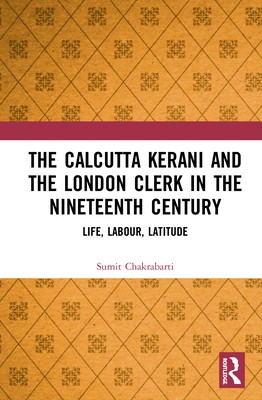
- We will send in 10–14 business days.
- Author: Sumit Chakrabarti
- Publisher: Routledge Chapman & Hall
- ISBN-10: 0367145723
- ISBN-13: 9780367145729
- Format: 15.5 x 23.6 x 1.5 cm, kieti viršeliai
- Language: English
- SAVE -10% with code: EXTRA
The Calcutta Kerani and the London Clerk in the Nineteenth Century (e-book) (used book) | bookbook.eu
Reviews
Description
This book examines the location and representation of the colonial clerk or the kerani within the cultural and social space of nineteenth century colonial India. It provides a comparative history of the clerk in Calcutta vis-Ã -vis the clerk in contemporary London in order to understand the manifestations of modernity in these two disparate but intimately related spaces.
The volume traces the socio-historical life of the clerk in the newly emerged city-space of Calcutta and reveals how the Bengali kerani became a complex and distinct figure of bureaucratic and colonial modernity. It analyses the techniques of surveillance and ethical training given to the native clerks and offers insights into the role of education in the production and dissemination of knowledge and hegemony in the colonial setting. The author, through a reading of clerk manuals, handbooks and literary representations, highlights the class and cultural identity of the English educated colonial clerk in the new city-space. He also focuses on the ambivalence and unreliability of the clerk or colonial babu who became complicit and gave legitimacy to the empire while personifying a complex modernity within the networks of the colonial administration.
This book will be of great interest to students and researchers of colonial and imperial history, literature, cultural studies, city studies, British studies, area studies, commonwealth studies and South Asian studies, particularly those interested in colonial Bengal.
EXTRA 10 % discount with code: EXTRA
The promotion ends in 22d.01:16:20
The discount code is valid when purchasing from 10 €. Discounts do not stack.
- Author: Sumit Chakrabarti
- Publisher: Routledge Chapman & Hall
- ISBN-10: 0367145723
- ISBN-13: 9780367145729
- Format: 15.5 x 23.6 x 1.5 cm, kieti viršeliai
- Language: English English
This book examines the location and representation of the colonial clerk or the kerani within the cultural and social space of nineteenth century colonial India. It provides a comparative history of the clerk in Calcutta vis-Ã -vis the clerk in contemporary London in order to understand the manifestations of modernity in these two disparate but intimately related spaces.
The volume traces the socio-historical life of the clerk in the newly emerged city-space of Calcutta and reveals how the Bengali kerani became a complex and distinct figure of bureaucratic and colonial modernity. It analyses the techniques of surveillance and ethical training given to the native clerks and offers insights into the role of education in the production and dissemination of knowledge and hegemony in the colonial setting. The author, through a reading of clerk manuals, handbooks and literary representations, highlights the class and cultural identity of the English educated colonial clerk in the new city-space. He also focuses on the ambivalence and unreliability of the clerk or colonial babu who became complicit and gave legitimacy to the empire while personifying a complex modernity within the networks of the colonial administration.
This book will be of great interest to students and researchers of colonial and imperial history, literature, cultural studies, city studies, British studies, area studies, commonwealth studies and South Asian studies, particularly those interested in colonial Bengal.


Reviews